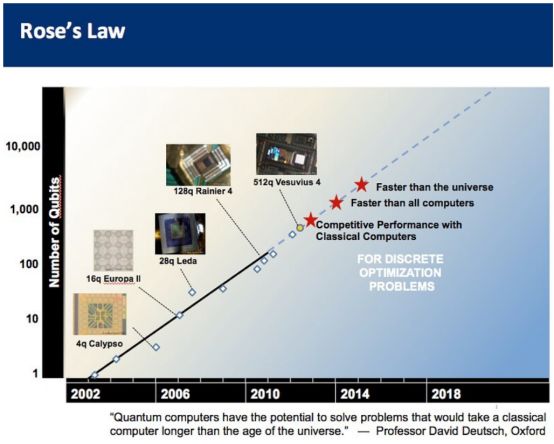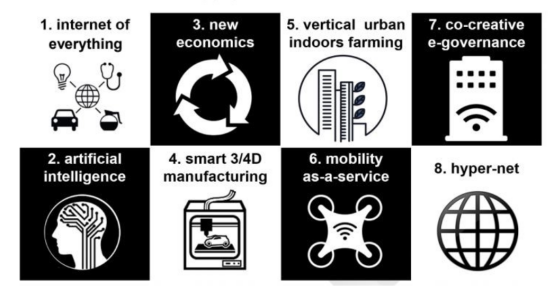Perspective | How will blockchain develop with the development of quantum computing and AI
As our world transitions to "Web 3.0," we see three main technologies dominating the headlines: blockchain, artificial intelligence, and quantum computing.

Quantum computing
According to people now, "classical computers" process data through binary. With quantum computing, you can use qubits to process data and information. Instead of only being able to process with 0 or 1, qubits can be superimposed with 0 and 1. According to the qubit superposition, when this information structure is measured, the qubit will change its form. Depending on the entanglement constraints, when trying to measure or observe multiple qubits, the particle pair or other qubits in the particle group will also change. Only under these two concepts of quantum mechanics, quantum computing systems have the capabilities of quasi-infinite, exponential growth, and quasi-instantaneous growth.
Let us now explore how "quantum-supported" artificial intelligence will extend the operation and functionality of the blockchain.
- Zhang Jian: FCoin is expected to be unable to pay approximately 7000-13000 BTC
- Analysis of CBDC International R & D (3): Who will master the "Adamian" of CBDC?
- Viewpoint: Are traditional valuation methods really effective? (on)
Quantum Computing Supported AI
At present, AI involves many aspects of modern society. Whether it's processing the next song or video we want to play, or credit card transactions monitored by a bank fraud system, AI will accompany our lives and pass it from generation to generation.
With the development of the latest artificial intelligence technology, we are experiencing things full of magical imagination. Putting aside the dystopian fear that AI occupies our collective consciousness, we see that AI is showing more and more human-like functions, such as speaking, thinking, empathy, and so on. Due to the complexity of the human brain, mainstream science can hardly understand its true function. AI will have to be intertwined with very advanced "Sci-Fi" (such as computer technology). This is where we now think that quantum computing is about to emerge.
Current supercomputers have proven to be smarter than humans at the logical "left brain" level. However, these supercomputers lack "right brain" functions, such as sensory input, emotion, empathy, intuition, and other "pseudo-scientific" capabilities that we may have. This level of artificial intelligence can be designed to better understand the inside and outside of life, and the world we live in, by creating different senses and IoT devices. However, quantum computing and its infinite exponent, processing power can enable AI to dig deep into human beings.
Imagine that when the computational process of these quantum machines reaches infinity, it will be possible to simulate the full spectrum, allowing AI to simulate left and right brain functions to try to imitate consciousness and self-consciousness.
Next, let us see how the development of quantum computing and artificial intelligence will affect the key technology in our "Web 3.0" transformation-blockchain.
Blockchain
Briefly introduced, the blockchain is a decentralized point-to-point network operated by nodes (hardware systems) or network participants who use encryption technology to create public working mechanisms. New transactions and records are time stamped in chronological order and then sent across a network of nodes for authenticity verification. Most of the systems and features in our world reside on a centralized system where the server / system owner has jurisdiction over most people. With blockchain, we see that privacy and decentralized order are now back in the hands of most people. This is showing new technological advances in a public, P2P way.
One of the most exciting advancements in blockchain technology is digital currencies. A digital, decentralized form of currency, represented by the store of value, the medium of exchange, and the unit of account. As we all know, BTC is the world's first decentralized digital currency, and it illuminates people's attention to the blockchain.
How is blockchain currently used?
In addition to being a basic system that supports the function and existence of digital currencies, blockchain is also used for many "intermediate" tasks, such as:
- Allow individuals to own their personal data through decentralized applications (Dapps) and IoT devices.
- Use a decentralized browser to browse the Internet for more privacy.
- Add speed and security to large transactions, such as buying real estate.
- Enhance the security of the voting process …

How will the blockchain develop?
In the development of AI mentioned above, we see that AI has the ability to better lead technology systems and influence people in a more influential way. Combined with the P2P aspect of the blockchain system and the deep learning of AI, this is more hopeful to make the technology closer to humans in a beneficial way. With the symbiotic development of blockchain and AI, we will see more intelligent visualization of decentralized information and data at multiple levels of infrastructure. Therefore, over time, the operation of the blockchain will become more efficient and accurate (depending on the appropriate AI algorithm). For example, through the customer's IoT devices and data applications, smarter analysis, organization, and visualization of big data tracked by customers can be used to more accurately and efficiently adjust real-time premiums for auto insurance customers.
With the development of AI, quantum computing will become part of the blockchain-based solution. Quantum computing will allow blockchain-based AI guidance systems to reach unimaginable application levels. At the basic blockchain level, the transaction verification process itself may have the ability to intertwine with the entanglement principle. So, imagine that there are hundreds of thousands to millions of transactions (TPS) per second that can be verified in real time in the network without delay?
On the other hand is the possibility of an AI protocol, because the AI protocol has a connection with each user at an unbreakable private level, and can learn detailed information about that user, as well as the subconscious activities of the customer, thereby affecting the emotional state and health , Financial forecasts, and more.
At the same time, quantum computing may be an indispensable ally based on blockchain technology. Cryptography hidden behind the blockchain system is essentially an advanced mathematical equation, so quantum computers can easily solve modern cryptographic problems. The quantum computer processes data with qubits, obeys the superposition rule, and calculates a quasi-infinite number of possibilities in a relatively limited time. But vice versa, the blockchain system is supported by a quantum computer and will be able to develop deeper levels of security.
To comment on this, imagine the scene in the Hollywood blockbuster, "The Enemy of Mechanical". This is a grand vision with a decentralized (P2P) network consisting of AI-guided, public service robots, and personal robots. These robots studying their owners may know that some humans don't even realize things about themselves, and they make life "better in every way."
We will continue to update Blocking; if you have any questions or suggestions, please contact us!
Was this article helpful?
93 out of 132 found this helpful
Related articles
- Five biggest misunderstandings about Eth2.0: ETH2.0 will never be launched? Will this fork produce two kinds of ETH tokens?
- Libra thinking about anchoring the US dollar as a single currency launch? The reason behind it is not simple
- Data Analysis | Do you really understand the computing power, block rate, and profit of the Filecoin network?
- Bitcoin is soaring, industry investment is heating up, and the air has come … you urgently need a cheat for customs clearance!
- How to become a successful Bitcoin HODLer? Must have at least these three basic qualities
- Ministry of Finance: National PPP Comprehensive Information Platform (New Platform) goes online, using blockchain and other technologies
- Attackers make a net profit of 350,000 US dollars. Can DeFi not only immoral arbitrage, but also centralization?





